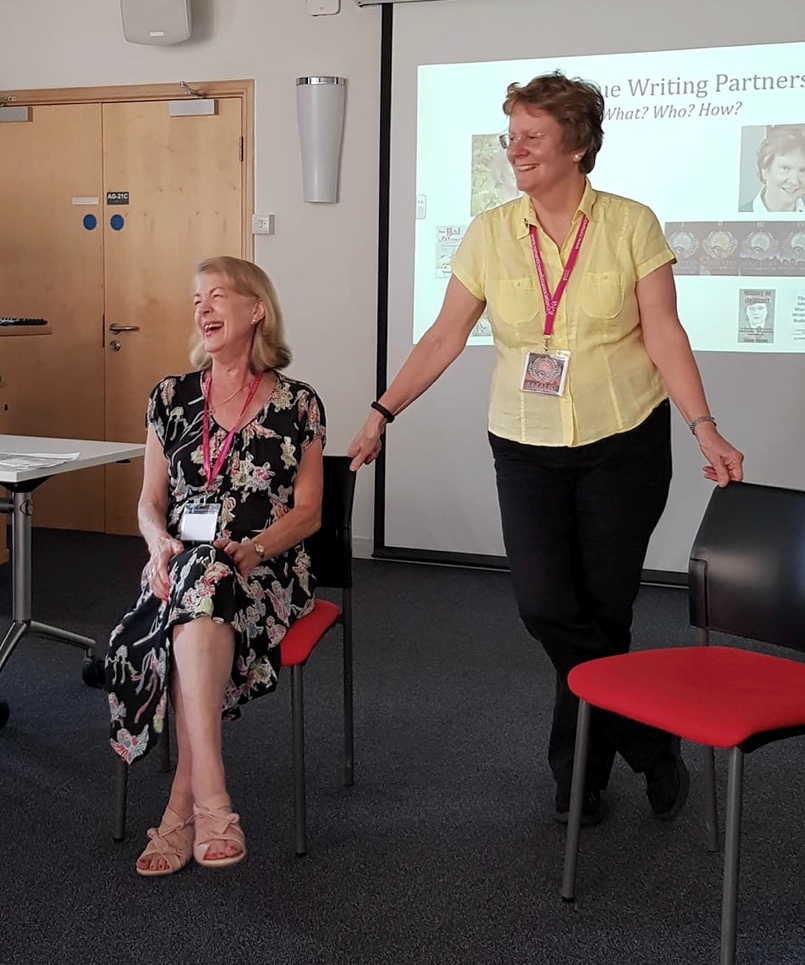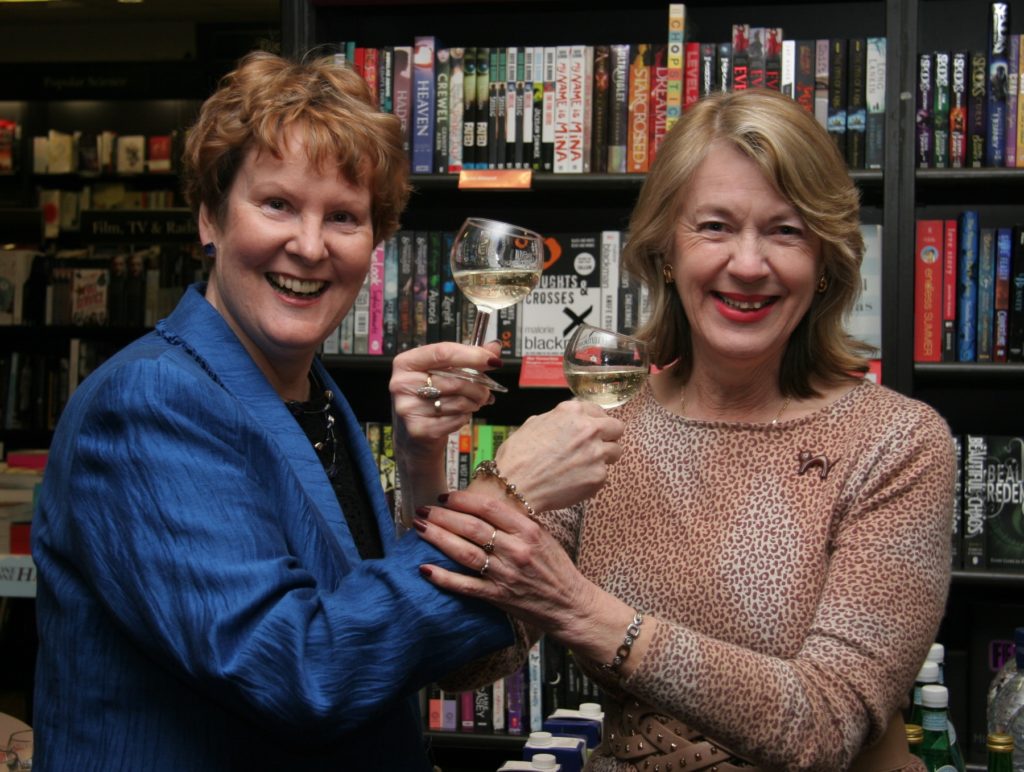 I enjoy a ‘writerly’ Skype with another novel writer, Denise Barnes – my critique Writing Partner (CWP). We swap hints and tips, recommend and exchange books, encourage each other about courses and competitions. But the best thing is that we read each other’s work and critique it. Now you have to get on well to do this, so well that you can say things that may seem harsh. But we have to be completely, and sometimes brutally, honest. It’s a pointless exercise otherwise. With both of us going through the same process, we can empathise as well as criticise.
I enjoy a ‘writerly’ Skype with another novel writer, Denise Barnes – my critique Writing Partner (CWP). We swap hints and tips, recommend and exchange books, encourage each other about courses and competitions. But the best thing is that we read each other’s work and critique it. Now you have to get on well to do this, so well that you can say things that may seem harsh. But we have to be completely, and sometimes brutally, honest. It’s a pointless exercise otherwise. With both of us going through the same process, we can empathise as well as criticise.
Her current novels are heartwarming Second World War stories with romantic themes, mine are alternative history thrillers. While our imagined worlds are ridiculously different, we drill down and become thoroughly enmeshed in each other’s characters and worlds. It’s spooky when she turns round to me and says about a piece of my heroine’s dialogue,’You know, Carina wouldn’t say it like that.’
Luckily, we both have outgoing personalities and having both owned businesses in a tough commercial environment, we have had to make difficult decisions and say things that were not always welcome. We’re quite nice really!
We have different strengths; mine is history, plotting and action (quelle surprise!), hers is the emotional side of life. But we are both grammar Nazis and she’s particularly good on flowing writing. We do disagree on commas, though… 😉
It’s a bit like any serious relationship: you go on a few (book) dates, get to know them find shared values, then take a leap as you move in with them (a.k.a. hand your whole manuscript over to them). Then you settle into an almost telepathic partnership and get to know every last secret about your partner’s writing…
 Like any relationship, it takes honesty, nurturing and above all listening. Trust is key: you are handing over your ‘baby’ for another to look at, assess and critique. But hopefully that person will stand as a godparent/patron/responsible adult and help the infant mature into a full-grown adult.
Like any relationship, it takes honesty, nurturing and above all listening. Trust is key: you are handing over your ‘baby’ for another to look at, assess and critique. But hopefully that person will stand as a godparent/patron/responsible adult and help the infant mature into a full-grown adult.
We’ve been doing this for ten years now and both have nearly that number of books under our respective belts, let alone countless posts, short stories and articles.
I expect to be still going on like this for the next ten.
So how do you find this writing soulmate, ally, confidante and critic?
- Join a local writing group – large or small – and get a feel of the different writers, their personalities, experience and goals
- Join larger writing societies and associations such as the Romantic Novelists’ Association, the Alliance of independent Authors (ALLi) and the Historical Novel Society and talk to people at their parties and conferences.
- Go on writing courses to improve your craft. You’ll meet other like-minded people serious about achieving their goals because they’ve laid out money for such tuition.
- Be open – Both of us were small business owners with no (apparent) literary pretensions, but both secretly bursting to be novel writers
You might have found a person who would be a good fit. Check the following:
- The two of you must be on the same wavelength for goals and have personalities which gel. The personality and character of the other is as important as her critique writing skills. As the relationship develops between the two of you, you will both find your rhythm, your style, your way of maintaining a close and comfortable relationship. The person who you think might be the right one could be a great match for another writer but in the end not suit you.
- It’s fine – often better – if the other person writes in a different genre from you as you will have fresh eyes for your partner’s work and they will for yours. If you both write, for instance, cosy crime, you might find it becomes rather competitive and you will always think your partner’s work is superior to your own. And she will think the same about yours!
- If they live a long way away, don’t rule them out. You can always Skype each week and arrange to meet occasionally in person.
- Know what you want/expect from your CWP. Is it help on plotting, characterisation, emotion, cliff hangers, layout, social media promotion, structure, early proof-reading for grammar, punctuation, typos etc., a sounding board, or cheer leader? You’ll find you both have various strengths and weaknesses just as in a business partnership
Vital dos and don’ts
- Do schedule in longer pieces of work such as a novella or a novel; agree together when you’ll be sending it to her and approximately when you’d like it returned. Keep to agreed deadlines.
- Never resent the time you spend critiquing each other’s work. It will highlight possible weaknesses and potential improvements in your own work.
- Remember it’s your work in the end. If you don’t agree with something your CWP suggests, then don’t do it. But before completely disregarding it, think about it.
- Be prepared to disagree. It’s part of the very nature of the relationship
- Never say the other’s work is good if, in your opinion, it’s not, but you’re afraid to hurt her feelings. Being kind won’t help her to be a success.
- Contact the other regularly even when you have nothing for her to critique, especially if you feel depressed with yet another rejection. She can remind you of past successes, even if it’s a short story that was long-listed, give you a kick up the bum if you haven’t been producing any writing lately, and say just one thing to get your creative juices going again.
- Resolve any disputes fast. Be honest, but accept that you might be wrong.
- Celebrate together and have fun!
Trust is the most important element of all. You have to trust that they’re good at writing, that they are serious about their writing, and most of all that they ‘get’ your work and critique it with what we call ‘Brutal Love’. This does not mean criticise them personally or diminish the other.
Good CWPs genuinely want the best for you. They want you to grow, to improve, to have successes. They are happy for you when you reach various milestones, and sympathise when you’ve had rejections, when you think you’ll never make it as a proper writer they will gee you up, cheer you on, and make you feel ready to face it all again.
Being recognised from your writing by the public is one of the most difficult things to achieve, but when it happens it’s so exciting. And your CWP will enjoy being part of your success – as you will hers!
Happy writing!
A bit about Denise
Denise Barnes has written and had published two memoirs, but was desperate to write a novel. So in 2005 she sold her business and began what was to become the award-winning historical trilogy: The Voyagers. She is now writing a second historical series for HarperCollins. The first one, An Orphan in the Snow, published Nov 2017, shot into The Bookseller’s top twenty chart. Currently, she’s writing about Bletchley Park after completing a series about the three Linfoot sisters during the Second World War.
It’s nearly a decade ago when Denise tentatively put her first horribly-rough manuscript into Alison’s hands, but happily admits she wouldn’t be where she is today without “the best CWP ever.”
www.denisebarneswriter.com https://mollygreenauthor.com/
Alison Morton is the author of Roma Nova thrillers – INCEPTIO, CARINA (novella), PERFIDITAS, SUCCESSIO, AURELIA, NEXUS (novella), INSURRECTIO and RETALIO, and ROMA NOVA EXTRA, a collection of short stories. Audiobooks are available for four of the series.Double Identity, a contemporary conspiracy, starts a new series of thrillers. JULIA PRIMA, a new Roma Nova story set in the late 4th century, is now out.
Find out more about Roma Nova, its origins, stories and heroines and taste world the latest contemporary thriller Double Identity… Download ‘Welcome to Alison Morton’s Thriller Worlds’, a FREE eBook, as a thank you gift when you sign up to Alison’s monthly email update. You’ll also be among the first to know about news and book progress before everybody else, and take part in giveaways.













Leave a Reply